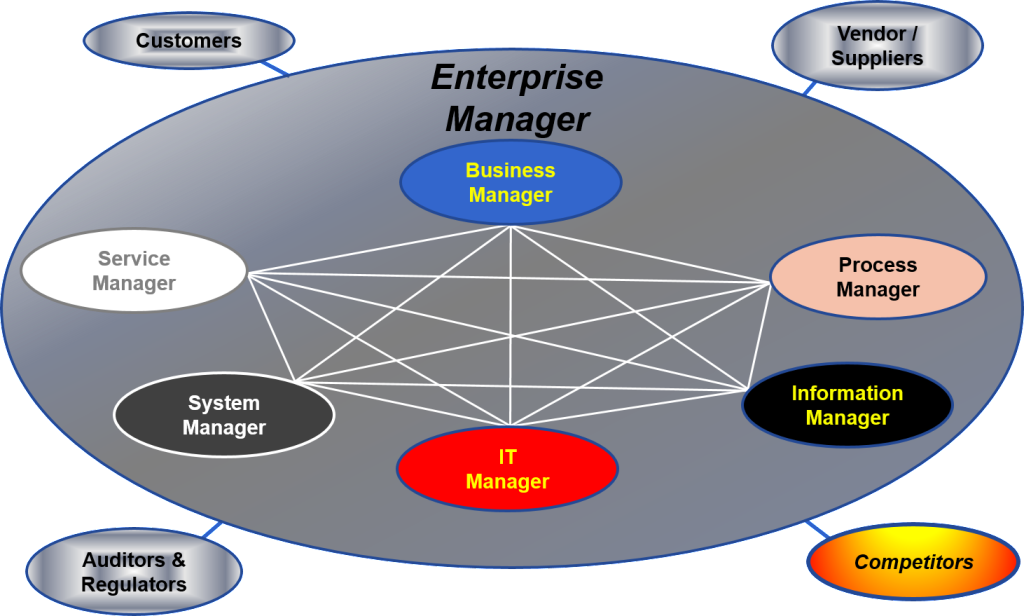The enterprise system manager role is a systematic ability to realize the role responsible for enterprise system management of the enterprise system capability.
The enterprise system manager role is supported by the enterprise system architect role.
The enterprise system manager role uses the enterprise system architecture to support enterprise system management responsibilities and activities.
The enterprise system architect role is responsible for the enterprise system architecture.
The enterprise system manager role has the focus, goals, objectives, responsibilities, skills, abilities, knowledge and experience to conceive, organize, govern, enable, manage, analyze, plan, execute, control, monitor, measure, improve and assure the enterprise system, the “whole of the enterprise” (all of what the enterprise is and all of what the enterprise does).
The enterprise system manager role is responsible for the enterprise system requirements, design, documentation, analysis, and planning, and for the management and sustainment of the enterprise system, throughout the enterprise system’s development, deployment, operation and improvement for the full life of the enterprise system including replacing or retiring the enterprise system and/or elements of the enterprise system.
The enterprise system manager role uses the enterprise system architecture as a management tool to support a systematic way of conceiving, organizing, governing, enabling, managing, analyzing, planning, executing, controlling, monitoring, measuring, improving and assuring the value-adding-resources of the enterprise and the success of the enterprise as a whole.
The enterprise system manager role responsibilities includes the management of business, process, information and IT capabilities and system and service offerings, the management of the customers, vendor/suppliers, industry standards and competitors of the enterprise, and for the management of the business, process, information, IT, systems and services with respect to these external systems.
The enterprise system manager role is the managerial role leading the enterprise architecture team and as the leading role has inter-dependencies with all team members and what the team members do. With the knowledge of how everyone fits in and the setting of expectations between everyone, the team will be a team and the enterprise system manager role will be able to best utilize the talent of the individuals.
As shown in Figure 30- Enterprise System Manager Concept Diagram, as the enterprise increases in size and complexity, it drives a need to allocate as necessary the enterprise system manager role responsibilities to the
- enterprise manager role
- business manager role
- process manager role
- information manager role
- IT manager role
- system manager role
- service manager role

Figure 30- Enterprise System Manager Concept Diagram
EA Practitioners in the Enterprise System Manager Role
In practice, the responsibilities of the enterprise system manager role are divided into managerial sub-roles. When the enterprise system manager role is divided, the enterprise system manager role enables and assures these managerial sub-roles are aligned in their efforts so their efforts properly align and each also aligns with all efforts throughout the enterprise.
It should be noted in practice, the enterprise system architect role must be filled by the enterprise system manager in situations where an enterprise system architect position does not exist in the enterprise.
It should also be noted in practice, the enterprise system managerial sub-roles are often combined to provide an organizationally needed job (a “specialty”) to address special needs and other organizational needs and limitations of the organization. A common example is the organizational position “Chief Information Officer (CIO)” may combine the information manager role and IT manager role into one organizational position.